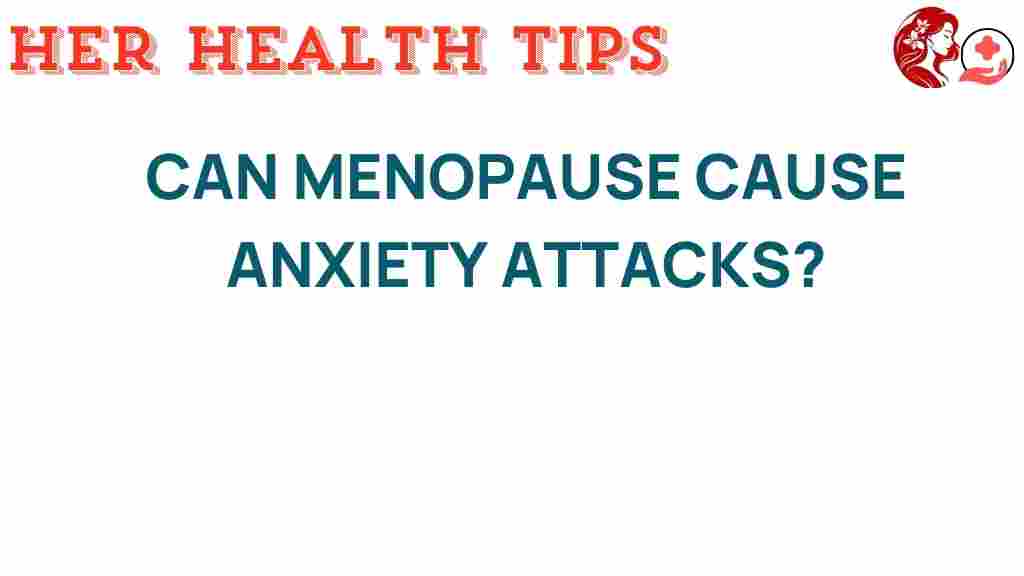Unraveling the Link Between Menopause and Anxiety Attacks
Menopause is a natural phase in a woman’s life that marks the end of her reproductive years. It is a significant transition that often brings about a variety of physical and emotional changes. One of the less discussed aspects of this transition is the link between menopause and anxiety. Understanding this relationship is crucial for maintaining mental health and emotional well-being during this time. In this article, we will explore the symptoms of menopause, the impact of hormonal changes on anxiety, and effective coping strategies for stress management.
Understanding Menopause
Menopause typically occurs between the ages of 45 and 55, though it can happen earlier or later for some women. It is defined as the time when a woman has not had a menstrual period for 12 consecutive months. The hormonal changes that occur during menopause, particularly the decrease in estrogen and progesterone, can lead to various physical and psychological symptoms.
Common Symptoms of Menopause
Women experience a range of symptoms during menopause, which can vary in intensity and duration. Some common symptoms include:
- Hot flashes
- Night sweats
- Sleep disturbances
- Weight gain
- Vaginal dryness
- Emotional changes, including anxiety and mood swings
The Connection Between Menopause and Anxiety
Research indicates that many women experience heightened anxiety during menopause. This can be attributed to several factors:
- Hormonal Changes: The decline in estrogen levels can affect neurotransmitters in the brain, such as serotonin, which plays a key role in regulating mood and anxiety.
- Physical Symptoms: The discomfort associated with symptoms like hot flashes and sleep disturbances can contribute to increased anxiety levels.
- Life Changes: Menopause often coincides with other life transitions, such as children leaving home or approaching retirement, which can add to stress and anxiety.
Understanding these links is essential for addressing mental health during this transitional period.
Impact on Mental Health
The interplay between menopause and anxiety can have profound effects on a woman’s mental health. Many women report feelings of irritability, anxiety, and mood swings during this time. These emotional changes can affect relationships, work performance, and overall quality of life.
It’s important to recognize that experiencing anxiety during menopause is not uncommon. Women should feel empowered to seek help and utilize coping strategies to manage their symptoms effectively.
Coping Strategies for Managing Anxiety During Menopause
Effectively managing anxiety during menopause involves a combination of lifestyle changes, therapeutic approaches, and self-care strategies. Here are some steps that can help:
1. Maintain a Healthy Lifestyle
Physical health significantly impacts mental health. Here are some healthy habits to adopt:
- Regular Exercise: Engage in physical activities such as walking, yoga, or swimming. Exercise releases endorphins, which can improve mood and reduce anxiety.
- Balanced Diet: Consume a diet rich in fruits, vegetables, whole grains, and lean proteins. Certain foods can help stabilize mood and energy levels.
- Stay Hydrated: Drink plenty of water to keep your body and mind functioning optimally.
2. Prioritize Sleep
Sleep disturbances are common during menopause. To improve sleep quality:
- Establish a regular sleep routine by going to bed and waking up at the same time each day.
- Create a restful sleeping environment, free from distractions.
- Avoid caffeine and electronics before bedtime to promote better sleep.
3. Practice Stress Management Techniques
Incorporating stress management techniques can alleviate anxiety:
- Meditation and Mindfulness: Practicing mindfulness can help you stay present and reduce anxious thoughts.
- Deep Breathing Exercises: Simple breathing exercises can calm the mind and reduce stress.
- Progressive Muscle Relaxation: This technique involves tensing and relaxing different muscle groups to relieve tension.
4. Seek Professional Help
If anxiety becomes overwhelming, it may be beneficial to seek help from a mental health professional. Therapy options include:
- Cognitive Behavioral Therapy (CBT): This type of therapy helps individuals identify and change negative thought patterns.
- Medication: In some cases, medication may be prescribed to help manage anxiety symptoms.
5. Connect with Support Groups
Connecting with others who are experiencing similar challenges can be therapeutic. Consider joining support groups for women going through menopause. These groups provide a safe space to share experiences and coping strategies.
Troubleshooting Common Issues
While the coping strategies outlined above are effective, you may encounter challenges along the way. Here are some troubleshooting tips:
- Inconsistent Exercise: If you struggle to maintain a workout routine, start small. Even short walks can be beneficial. Gradually increase your activity level as you feel comfortable.
- Sleep Disruptions: If sleep remains elusive, consult with a healthcare provider. They can help identify underlying issues and suggest appropriate interventions.
- Difficulty with Mindfulness: If you’re new to meditation, consider using apps or guided sessions to help you get started.
Conclusion
The link between menopause and anxiety is complex, influenced by hormonal changes, physical symptoms, and life transitions. However, women do not have to navigate this challenging time alone. By understanding the symptoms of menopause and implementing effective coping strategies, women can enhance their mental health and emotional well-being.
Remember, seeking help is a sign of strength, and there are many resources available to support you through this transition. For more information on women’s health and mental well-being, visit this resource. Don’t hesitate to reach out to healthcare professionals who can provide personalized support and guidance.
By prioritizing mental health during menopause, women can thrive through this significant life change, embracing the opportunities that this new phase of life presents.
This article is in the category Reproductive and created by HerHealthTips Team
